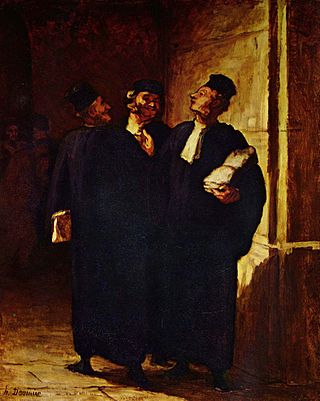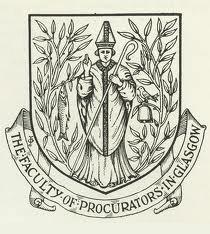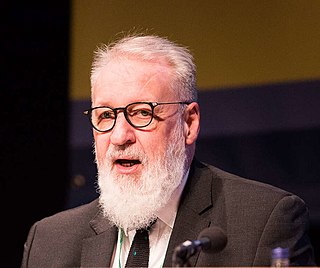
A barrister is a type of lawyer in common law jurisdictions. Barristers mostly specialise in courtroom advocacy and litigation. Their tasks include arguing cases in courts and tribunals, drafting legal pleadings, researching the law and giving legal opinions.

An "advocate" is a professional in the field of law. Different countries and legal systems uses the term with somewhat differing meanings. The broad equivalent in many English law–based on jurisdictions could be a barrister or a solicitor. However, in Scottish, Manx, South African, Italian, French, Spanish, Portuguese, Scandinavian, Polish, Israeli, South Asian and South American jurisdictions, "advocate" indicates a lawyer of superior classification.
A solicitor is a legal practitioner who traditionally deals with most of the legal matters in some jurisdictions. A person must have legally-defined qualifications, which vary from one jurisdiction to another, to be described as a solicitor and enabled to practise there as such. For example, in England and Wales a solicitor is admitted to practise under the provisions of the Solicitors Act 1974. With some exceptions, practising solicitors must possess a practising certificate. There are many more solicitors than barristers in England; they undertake the general aspects of giving legal advice and conducting legal proceedings.

Legal education is the education of individuals in the principles, practices, and theory of law. It may be undertaken for several reasons, including to provide the knowledge and skills necessary for admission to legal practice in a particular jurisdiction, to provide a greater breadth of knowledge to those working in other professions such as politics or business, to provide current lawyers with advanced training or greater specialisation, or to update lawyers on recent developments in the law.
The call to the bar is a legal term of art in most common law jurisdictions where persons must be qualified to be allowed to argue in court on behalf of another party and are then said to have been "called to the bar" or to have received "call to the bar". "The bar" is now used as a collective noun for barristers, but literally referred to the wooden barrier in old courtrooms, which separated the often crowded public area at the rear from the space near the judges reserved for those having business with the court. Barristers would sit or stand immediately behind it, facing the judge, and could use it as a table for their briefs.
Legum Doctor (LL.D.) or, in English, Doctor of Laws, is a doctorate-level academic degree in law or an honorary degree, depending on the jurisdiction. The double “L” in the abbreviation refers to the early practice in the University of Cambridge to teach both canon law and civil law, with the double “L” itself indicating the plural, although Cambridge now gives the degree the name Doctor of Law in English. This contrasts with the practice of the University of Oxford, where the degree that survived from the Middle Ages is the DCL or Doctor of Civil Law (only).

The Faculty of Advocates is an independent body of lawyers who have been admitted to practise as advocates before the courts of Scotland, especially the Court of Session and the High Court of Justiciary. The Faculty of Advocates is a constituent part of the College of Justice and is based in Edinburgh.

Lady Elish Frances Angiolini is a Scottish lawyer who currently serves as Lord Clerk Register. Angiolini currently works at the University of Oxford and has been identified as a potential candidate in the 2024 University of Oxford Chancellor Election.

The Law Society of Scotland is the professional governing body for Scottish solicitors. It's goal is to promote excellence among solicitors through the support and regulation of its members. It is also committed to promoting the interests of the public in relation to the profession. The Society seeks to contribute to the shaping of the law for the benefit of both the public and the profession.
Legal executives are a form of trained legal professional in certain jurisdictions. They often specialise in a particular area of law. The training that a Legal Executive undertakes usually includes both vocational training and academic qualifications.
Legal education in the United Kingdom is divided between the common law system of England and Wales and Northern Ireland, and that of Scotland, which uses a hybrid of common law and civil law.
An admission to practice law is acquired when a lawyer receives a license to practice law. In jurisdictions with two types of lawyer, as with barristers and solicitors, barristers must gain admission to the bar whereas for solicitors there are distinct practising certificates.
Dame Margaret Henderson Kidd, Mrs MacDonald, was a Scottish legal advocate, editor and politician. She was the first woman to become a member of the Faculty of Advocates, the first woman advocate to appear before the House of Lords and before a parliamentary select committee and in 1948, the first British woman King's counsel.

Francis Mulholland, Lord Mulholland, is a Scottish judge who has been a Senator of the College of Justice since 2016. He previously served from 2011 to 2016 as Lord Advocate, one of the Great Officers of State of Scotland and the country's chief Law Officer, and as Solicitor General, the junior Law Officer.

The School of Law at the University of Glasgow provides undergraduate and postgraduate courses in Law, and awards the degrees of Bachelor of Laws, Master of Laws, LLM by Research, Master of Research (MRes) and Doctor of Philosophy, the degree of Doctor of Laws being awarded generally only as an honorary degree.
The Isle of Man Law Society is the professional body in respect of the advocates' profession in the Isle of Man. The Society's role is to regulate and to provide a service for its members.

The Royal Faculty of Procurators in Glasgow is a professional body of legal practitioners based in Glasgow and providing services to lawyers in the city and the surrounding area. The Faculty owns and operates the largest law library in the West of Scotland as well as a small branch library at Glasgow Sheriff Court, and runs a programme of continuing professional development (CPD) seminars.
Sir Ernest MacLagan Wedderburn was a Scottish lawyer, and a significant figure both in the civic life of Edinburgh and in the legal establishment. He held the posts of Professor of Conveyancing in the University of Edinburgh (1922–35), Deputy Keeper of the Signet (1935–54), and Chairman of the General Council of Solicitors (1936–49), the forerunner to the Law Society of Scotland, and chaired the latter 1949/50. He was also an enthusiastic amateur scientist, and first Treasurer then Vice President of the Royal Society of Edinburgh.

The Scottish Sentencing Council is an advisory non-departmental public body in Scotland that produces sentencing guidelines for use in the High Court of Justiciary, sheriff courts and justice of the peace courts. Judges, sheriffs, and justices of the peace must use the guidelines to inform the sentence they pronounce against a convict, and they must give reasons for not following the guidelines.

Alistair John MacKenzie Duff is a former Scottish advocate and sheriff who later became Director of the Judicial Institute of Scotland before resigning after being arrested and charged with undisclosed offences.












